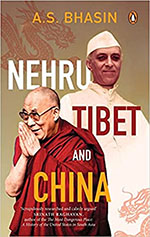Bhasin’s much celebrated book Nehru, Tibet and China is an exceptionally enlightening volume because it draws its methodology from basic rules of historiography. Among the numerous books available on the subject over the years and the attention it has garnered recently after the latest clash in Galwan, it is no less than a tremendous feat, that yet another piece has been attempted that not only places the historicity of the context, genesis of the dispute and furnishes a rather honest, at times, stark portrayal of the failure of Nehru’s China policy without the commonplace bitterness from Nehru’s detractors.
The successful balancing of interpretation of (un)comfortable facts that the book champions throughout its expanse comes from a simple premise that Bhasin has stuck to—by inextricably placing the various strands of India-China border dispute in their historical context. In the preface itself, the author writes, ‘My instinct as a student of history compelled me to undertake the present study and put forward the factual history of those turbulent days before the people of India, as emerging from those documents.’ By ‘those documents’, the author implies the classified documents which were until recently hidden from public domain.

